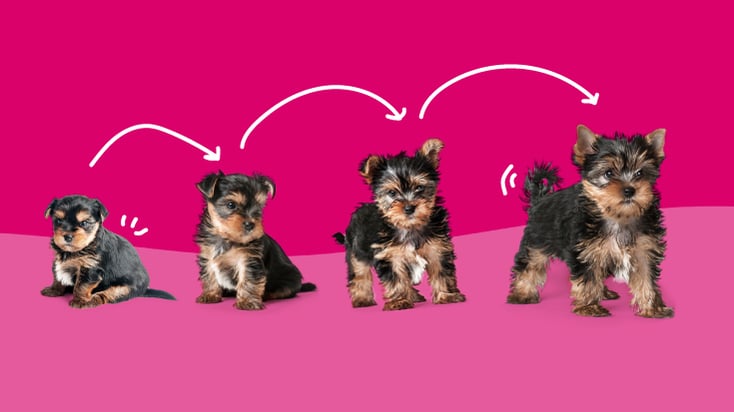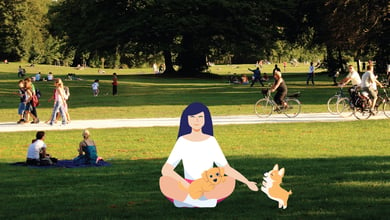Puppy Development Stages and Key Milestones

Table of Contents
Each puppy development stage comes with its own challenges. As a pet parent, giving your pups proper care, training, and nutrition helps ensure the pets become happy, healthy, and integrated into your family.
As we learn about puppy milestones and stages, remember that breed-specific growth patterns, the environment, and your experience will influence how your pup develops. Therefore, the timing of puppy milestones can vary depending on your pup's specific circumstances.
Here are the 5 stages of puppy development:
1. Neonatal Period (0-2 Weeks)
During the neonatal period, puppies can't see or hear, as their eyes and ears have not opened yet. For the first two weeks of your puppy's life, they will entirely depend on their mother for survival and growth.
While their sight and hearing are not yet functional, their sense of smell is well-developed, and they use it to find their mother and littermates. The new puppies will depend entirely on their mother's milk for all of their nutrients.
The first two to five days are extremely important as their mothers milk is rich in colostrum which contains protective antibodies for their immune system.
If you are raising newborn puppies without their mother, schedule a nutritional consultation to get the right puppy milk replacement formula to support their immune system.
How Big Will My Puppy Get?
How Big Will My Puppy Get?
View Results
2. Transitional Period (2-4 Weeks)
During the transitional period, most puppies begin to open their eyes and ears, gradually gaining awareness of their surroundings. They also start to walk, make cute sounds, and even attempt to play with each other, laying the foundation for important social skills that will impact lifelong behavior.
Introduce them to friendly people and let them play where no unvaccinated dogs frequent, e.g., your backyard.
Some young puppies begin to experiment with soft, moistened solid foods at three weeks when their baby teeth start to come through. As they start teething and chewing, consult with your veterinarian about the best approach to the weaning process over the next four to five weeks.
3. Socialization Period (3-12 Weeks)
The first twelve weeks are crucial for puppy socialization and training.
During the socialization period, puppies are highly receptive to new experiences and interactions with people, other animals, and their environment. Good use of this socialization window helps puppies become confident, well-adjusted dogs.
However, a lack of socialization can lead to fearfulness, anxiety, and even aggression in adulthood. It's important for pet parents to expose their puppies to other vaccinated dogs and people in a controlled environment during this period.
Pet parents can start training their puppies after the first round of puppy vaccines against diseases like parvovirus, distemper, and parainfluenza.
When potty training, establish a regular routine for bathroom breaks and praise your puppy when they eliminate outdoors. Be patient and understanding since accidents are part of the learning process.
Also, crate-train your puppy to prevent destructive behavior when you can't supervise.
4. Testing Period (3-6 Months)
The testing period in puppy development is when they start exploring the world. Be mentally prepared as your puppies start to explore and test their limits, just like human teenagers do. It's crucial to remain patient, consistent, and understanding during this period.
Throughout the puppy timeline, avoid physical punishment when your dog misbehaves. Use positive reinforcement techniques for training, maintain a consistent set of rules and boundaries, and enroll them in puppy obedience classes to reinforce basic commands.
5. Adolescence and Beyond (6 Months and Up)
As the puppy stage ends and your dog becomes an adolescent, they may experience sexual maturity if not spayed or neutered. Consider spaying or neutering your dog between six and twelve months in consultation with your veterinarian.
Adolescent dogs may challenge your authority and require ongoing obedience training and reinforcement of commands.
Conclusion
Understanding puppy growth stages lays the groundwork for happy, well-adjusted adult dogs. From the neonatal phase, where they rely on maternal care, to adolescence and beyond, these puppy phases serve a vital purpose in leading them through their physical and behavioral milestones. Exercise patience and love throughout this journey as they depend on your guidance to thrive.
As puppies mature, pet parents should schedule routine puppy wellness exams until they reach physical maturity.
Stress-Free Wellness Exams for Your Growing Fur Baby
With our in-home visits, your kitten or puppy can snooze away while we keep their vaccines up-to-date and ensure they're on the right paw to a healthy and happy life.
Related Articles:
- New Puppy Checklist: Starter Kit of Puppy Essentials
- Puppy First Vet Visit: What to Expect
- Puppy Teething: Timeline and What to Expect
- Leaving a Puppy Alone at Home for the First Time
- When do Puppies Stop Growing?
Frequently Asked Questions
How do I potty-train my puppy?
Establish a consistent schedule for bathroom breaks, reward them for eliminating outdoors, and closely supervise them indoors to prevent accidents.
What should I do if my puppy has accidents indoors?
Accidents are common when training your puppy. Remain calm, avoid punishment, and reinforce positive bathroom habits with consistent potty training sessions.
What are "fear periods" in puppies?
"Fear periods" in the puppy stages of development are when they may become more anxious or fearful of new experiences.
How can I help my puppy during a fear period?
Provide a secure and calm environment, and use positive reinforcement and gentle exposure to gradually desensitize them.
How should I adjust my puppy's diet as they grow?
Consult with your veterinarian to determine the appropriate age to switch from puppy food to adult food and for the best nutrition for each puppy depending on their breed and size.






